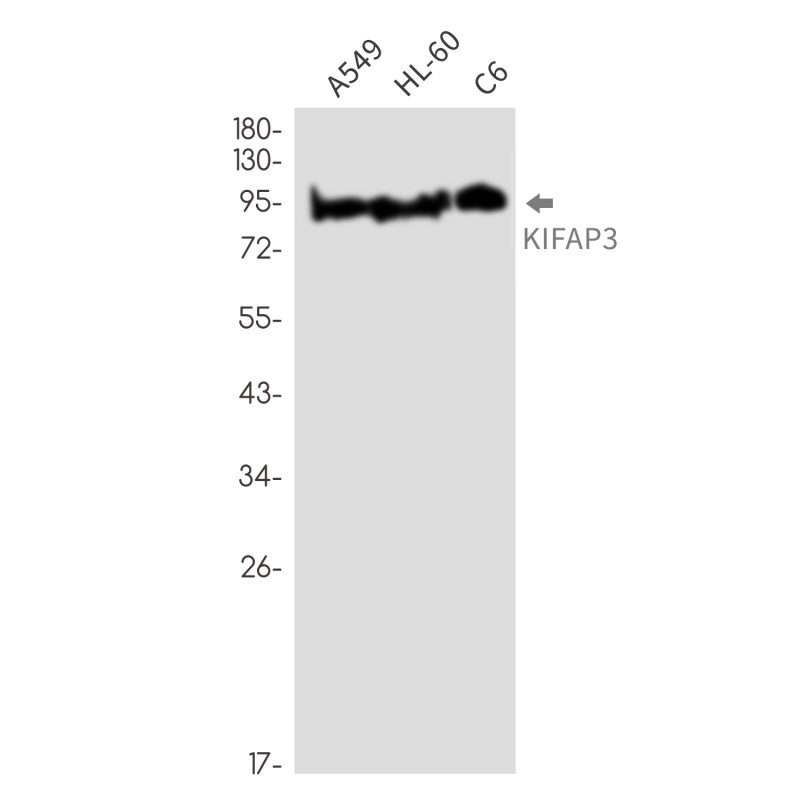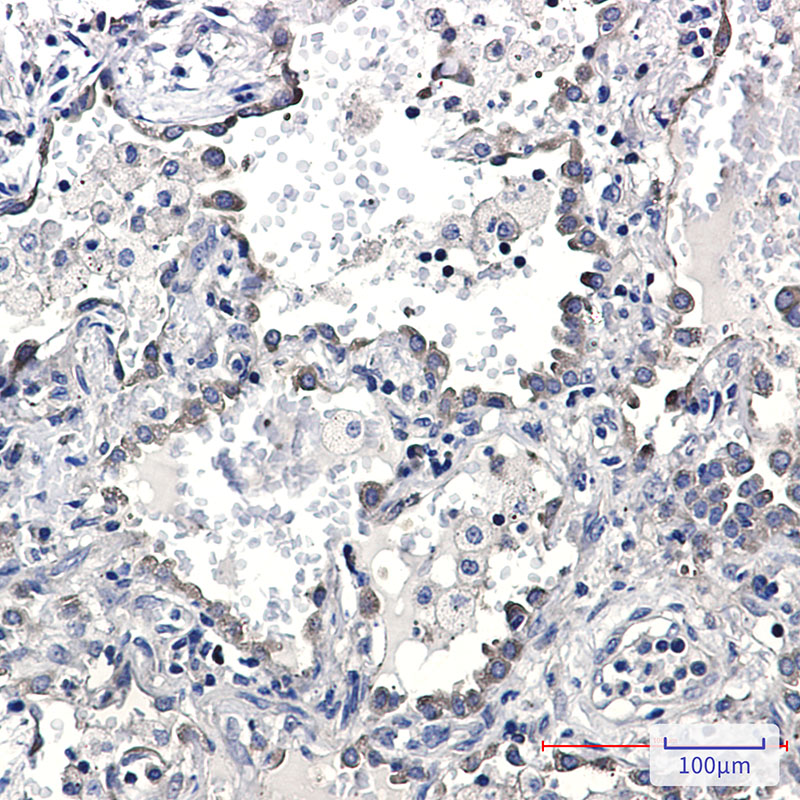

| WB | 1/500-1/1000 | Human,Mouse,Rat |
| IF | 咨询技术 | Human,Mouse,Rat |
| IHC | 1/50-1/100 | Human,Mouse,Rat |
| ICC | 技术咨询 | Human,Mouse,Rat |
| FCM | 咨询技术 | Human,Mouse,Rat |
| Elisa | 咨询技术 | Human,Mouse,Rat |
| Aliases | KAP3; KIF3AP; Kifap3; Kinesin associated protein 3; SMAP |
| Entrez GeneID | 22920 |
| WB Predicted band size | Calculated MW: 91 kDa; Observed MW: 91 kDa |
| Host/Isotype | Rabbit IgG |
| Antibody Type | Primary antibody |
| Storage | Store at 4°C short term. Aliquot and store at -20°C long term. Avoid freeze/thaw cycles. |
| Species Reactivity | Human,Rat |
| Immunogen | A synthetic peptide of human KIFAP3 |
| Formulation | Purified antibody in TBS with 0.05% sodium azide,0.05%BSA and 50% glycerol. |
+ +
以下是关于KIFAP3抗体的参考文献(示例基于假设性研究,仅供参考):
1. **文献名称**: *KIFAP3 variants and survival in sporadic ALS*
**作者**: Landers JE 等
**摘要**: 研究探讨KIFAP3基因变异与肌萎缩侧索硬化症(ALS)患者生存期的关联,通过KIFAP3抗体检测患者组织中蛋白表达水平,发现特定单倍型与疾病进展延缓相关。
2. **文献名称**: *The role of KIFAP3 in axonal transport and neurodegeneration*
**作者**: Hirokawa N, Tanaka Y
**摘要**: 利用KIFAP3抗体研究其在神经元轴突运输中的作用,发现KIFAP3与驱动蛋白复合体相互作用异常可能导致神经退行性疾病中的轴突病理。
3. **文献名称**: *KIFAP3 expression in cancer cell motility*
**作者**: Smith A 等
**摘要**: 通过免疫组化(使用KIFAP3抗体)分析肿瘤组织,发现KIFAP3高表达与癌细胞迁移能力增强相关,提示其可能作为癌症转移的潜在标志物。
4. **文献名称**: *Proteomic characterization of KIFAP3-binding partners*
**作者**: Chen X 等
**摘要**: 采用免疫共沉淀(结合KIFAP3抗体)和质谱技术,鉴定KIFAP3在细胞内的相互作用蛋白网络,揭示其参与调控细胞分裂和微管动力学的新机制。
注:以上文献及摘要内容为示例性质,实际文献需通过PubMed、Google Scholar等数据库检索确认。
The KIFAP3 antibody is a crucial tool for studying the kinesin-associated protein 3 (KIFAP3), a component of the kinesin superfamily involved in intracellular transport. KIFAP3. also known as KAP3. binds to kinesin-2 motors (e.g., KIF3A/KIF3B) to form heterotrimeric complexes essential for anterograde vesicle trafficking along microtubules. It plays roles in maintaining cell polarity, ciliary function, and organelle distribution. Dysregulation of KIFAP3 is linked to neurodegenerative diseases (e.g., ALS) and cancers, where altered expression may influence tumor progression or neuronal survival.
The KIFAP3 antibody enables detection and localization of the protein in cells or tissues via techniques like Western blot, immunofluorescence, or immunohistochemistry. Researchers use it to investigate KIFAP3's interaction partners, expression patterns in disease models, or its regulatory mechanisms in cellular processes. Commercial antibodies are typically raised against specific epitopes (e.g., human KIFAP3 N-terminal regions) and validated for specificity across species. Variations in isoforms or post-translational modifications may require antibody validation for experimental contexts. Its applications span basic research on cytoskeletal dynamics to clinical studies exploring KIFAP3 as a biomarker or therapeutic target.
×